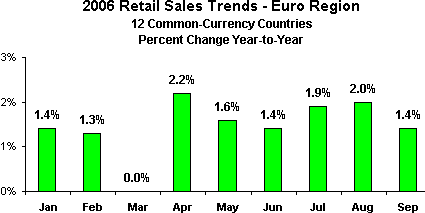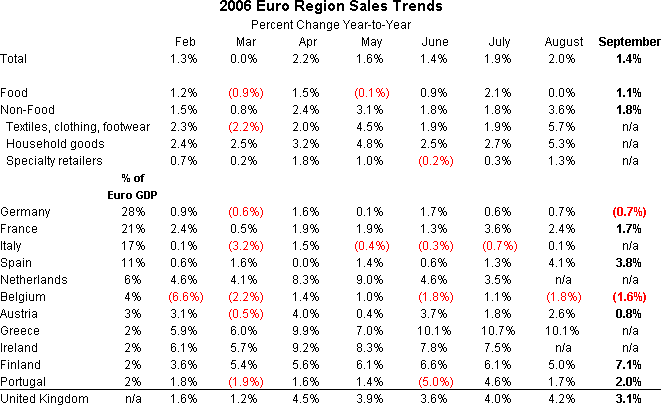IDEX Online Research: Euro Region Sales Slow in September
November 09, 06
Retail sales in the Euro Region slowed considerably in September. While sales gains had been strong in the spring and summer, consumer spending has begun to cool along with the weather as fall envelopes the European Region.
While rising employment and low interest rates fueled consumer spending in the first half of 2006, economic growth is beginning to slow in the Euro Region. Employment growth has also begun to moderate, and interest rates are headed higher.
The graph below illustrates the slowdown in retail sales gains in the Euro Region, as measured by month on a year-to-year basis. This is a broad-based retail sales index, and includes countries in the common currency area as well as other major economic powers in the region, such as the U.K.

Source: EuroStat
Retail Sales Stronger in Non-Food Categories
Retail sales in the Euro Region are subdivided by two major categories – Food and Non-Food. Retail sales of “food” rose by 1.1 percent in September, while “non-food” retail sales were up by a much stronger 1.8 percent. For most of 2006, non-food sales gains were significantly stronger than food sales gains.
Jewelry sales results are not available from Euro Region government statistical offices. However, jewelry demand tends to reflect broader market trends. This would indicate that jewelry sales were relatively strong in September among merchants in the Euro Region.
Consumer Demand Mixed Across Euro Region
On a country-by-country basis, September retail sales varied – sometimes quite significantly – by geopolitical entity in the European Region.
In Germany, consumers stayed out of the stores. As a result, this country, which represents about 28 percent of Euro-Zone GDP, posted a retail sales decline of 0.7 percent in September. The unemployment rate in Germany remains relatively high. Further, spending related to this past summer’s World Cup competition is over. But we are surprised that consumers haven’t engaged in anticipatory buying, since Germany’s VAT is slated to rise in January 2007.
Sales held up in both France and Spain, the second and fourth largest economies in the E-Z, respectively. In Spain, consumer spending is supported by the positive wealth effect of real estate price appreciation. This strength will slow as interest rates rise. Further, consumer credit has risen sharply in recent months; this important factor supporting consumer spending is likely to slow in the coming months.
In France, the labor market has improved substantially since the beginning of the year, and consumers appear eager to spend. But the cycle is ending, according to analysts, and retail sales gains have already begun to slow (see table below).
In the U.K., not technically a part of the E-Z, but a major economic power in the Euro Region, retail sales have also begun to slow. Analysts say that “spending fatigue” from spending binges earlier this year, coupled with concerns about the high household debt burden, are dampening consumer demand for goods in the U.K.
The following table summarizes retail sales by country in our Euro Region sample.

Source: EuroStat
Euro Region Outlook Mixed
While the Gross Domestic Product in the Euro Region remains relatively strong, most forecasters agree that the European Central Bank will raise interest rates by the end of this year. Already, the psychological fall-out from this forecast has hit consumer demand. In America, the prospects of higher interest rates would cause consumers to run out to the stores and buy everything in sight, hoping to beat higher priced merchandise which will surely be the result of higher interest rates. European consumers, despite having a common cultural heritage with most Americans, take the opposite view. Perhaps they are pessimists at heart, but the prospects of higher interest rates or higher prices cause them to tighten their purse strings.
While economic growth remains relatively solid, IDEX Online Research now believes that retail sales in the Euro Zone in the final quarter of the year will show more moderate gains.
As the projected global economic slowdown takes hold in early 2007, European consumers will further tighten their spending habits, which will put pressure on European jewelers’ sales and profits for the year.